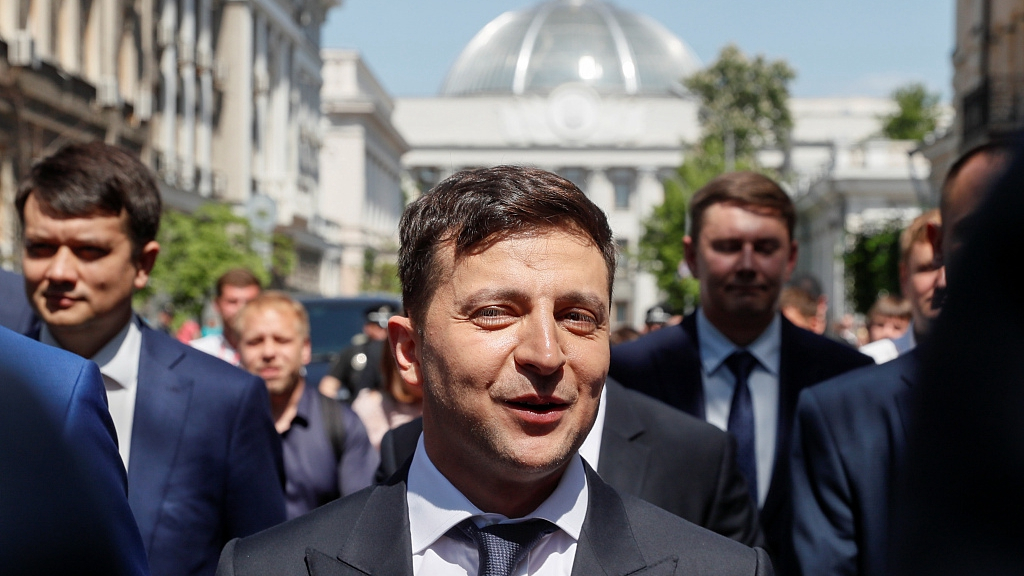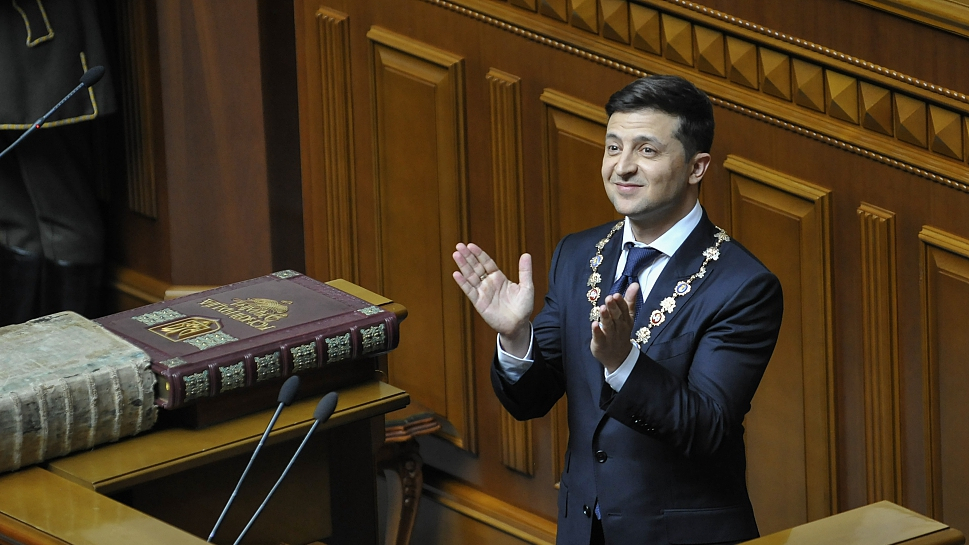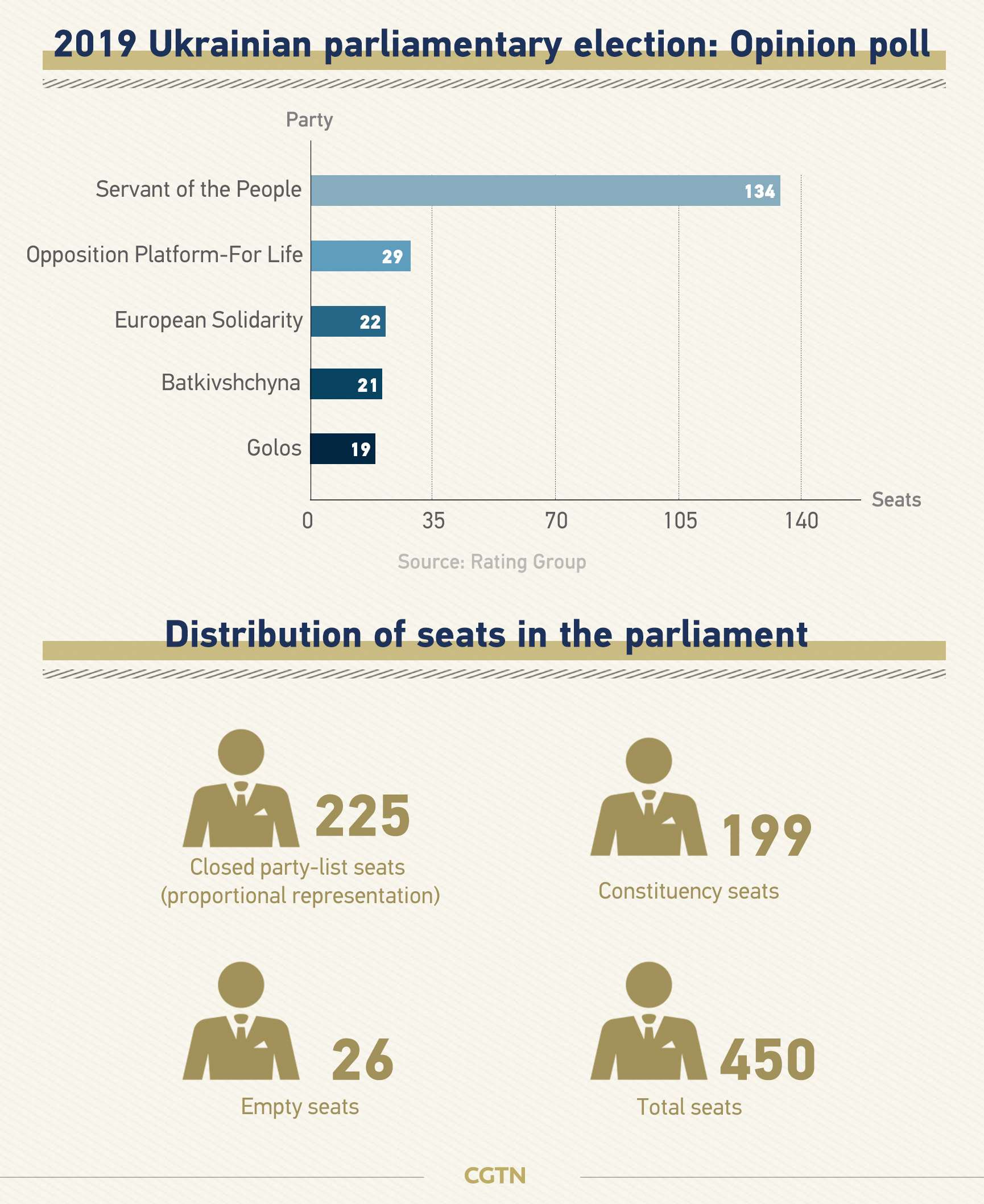

Ukraine will hold a snap parliamentary election Sunday, three months ahead of the original date, following recently-elected President Volodymyr Zelensky's dissolution of parliament in his inaugural speech on May 21.
With a landslide victory, Zelensky was sworn in as Ukraine's sixth president in May and has promised reform. Shortly after his shock victory, the former comedian made his first big move by dissolving the parliament, also known as the Verkhovna Rada, in the name of "scrubbing Ukraine's parliament clean of corruption and nepotism."

New Ukrainian President Volodymyr Zelensky during his inauguration ceremony at the Ukrainian parliament, Kiev, Ukraine, May 20, 2019. /VCG Photo
If Zelensky's victory caused a political earthquake in Ukrainian politics, the snap parliamentary election could be regarded as the aftermath of his shock victory.
However, questions remain about whether Zelensky and his Servant of the People (SOTP) party can gain representation in the current parliament. With the SOTP's lack of representation in parliament, the stakes are high for Zelensky to see if he can win another victory to push his agenda through.
A parliament full of fresh faces?
Polls tend to give an intuitive picture of elections. According to the latest polls conducted by the Kiev International Institute of Sociology, among the five political parties that are expected to gain the five percent threshold, SOTP retains a healthy lead with a majority 52.3 percent of support, well beyond the Opposition Platform – For Life, which comes in second with a rating of 10.3 percent.
Given the overwhelming lead in polls, some believe that the SOTP may have a chance of winning more than 50 percent of the vote and form the first-ever single-party government in Ukraine's history.

According to Ukraine's election law, a party needs 226 out of the total 450 seats (including 26 empty seats) to form a majority. As indicated by recent polls, with over 50 percent of support, SOTP is likely to take 130 party-list seats distributed proportionally, predicts Brian Mefford from the think tank Atlantic Council.
Meanwhile, due to Ukraine's mixed voting system which stipulates that the other half of the seats is comprised of the first-past-the-post candidates, Mefford holds a cautious attitude, saying that the SOTP may need to form a coalition with at least one party to ensure sufficient votes to pass key issues due to "mathematical realities."
In short, if the polls stand, it may indicate that around half of Ukraine's new parliament will be composed of fresh faces with no political experience. The scenario, in Kiev-based writer and founder of Lifeline Ukraine Paul Niland's words, is "a missing set of checks and balances."

An information placard about the leaders of Ukraine's opposition platform – Lifeline Ukraine is seen at a polling station in Kiev, Ukraine, July 19, 2019. /VCG Photo
Radical changes
Looking beyond the parliamentary election, experts believe that Zelensky's popularity represents an anti-establishment mood in Ukraine as a result of disappointment in the country's politics in recent years.
A survey delivered by the sociological group Rating supports the statement, showing that some 87 percent of Ukrainians said the country needed "radical changes" rather than stability.
Though the results of the parliamentary election remains unknown, Ukraine, under Zelensky's administration, is expected to implement a series of social reforms aiming to trigger radical changes.

Ukraine's President Volodymyr Zelensky greets his supporters outside the Mariyinsky Palace ahead of his inauguration ceremony, May 20, 2019. /VCG Photo
Ukrainian non-profit media organization Hromadske categorized SOTP's policies into nine aspects: government administration, anti-corruption, national defense, business and economy, energy and environment, infrastructure, healthcare, legislation and diplomacy.
Head of the SOTP Dmytro Razumkov said quoted by Hromadske as saying if the upcoming parliamentary election is the second wave of change, "the formation of a professional government of national trust, a restart of the executive authorities and law enforcement bodies" will be the third wave.
These altogether indicate that the upcoming parliamentary election may not be the end of the turbulence in Ukrainian politics; instead, it probably helps pave way for more radical changes to come under Zelensky's administration.
(Cover: Ukraine's President Volodymyr Zelensky walks from the parliament to the presidential administration office after his inauguration in Kiev, Ukraine, May 20, 2019. /VCG Photo)

Copyright © 2018 CGTN. Beijing ICP prepared NO.16065310-3
Copyright © 2018 CGTN. Beijing ICP prepared NO.16065310-3